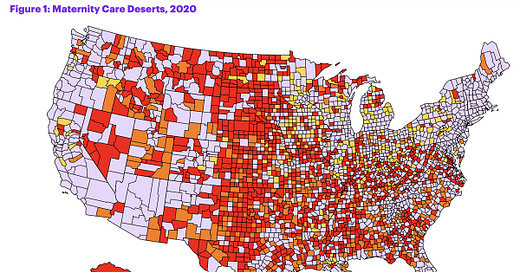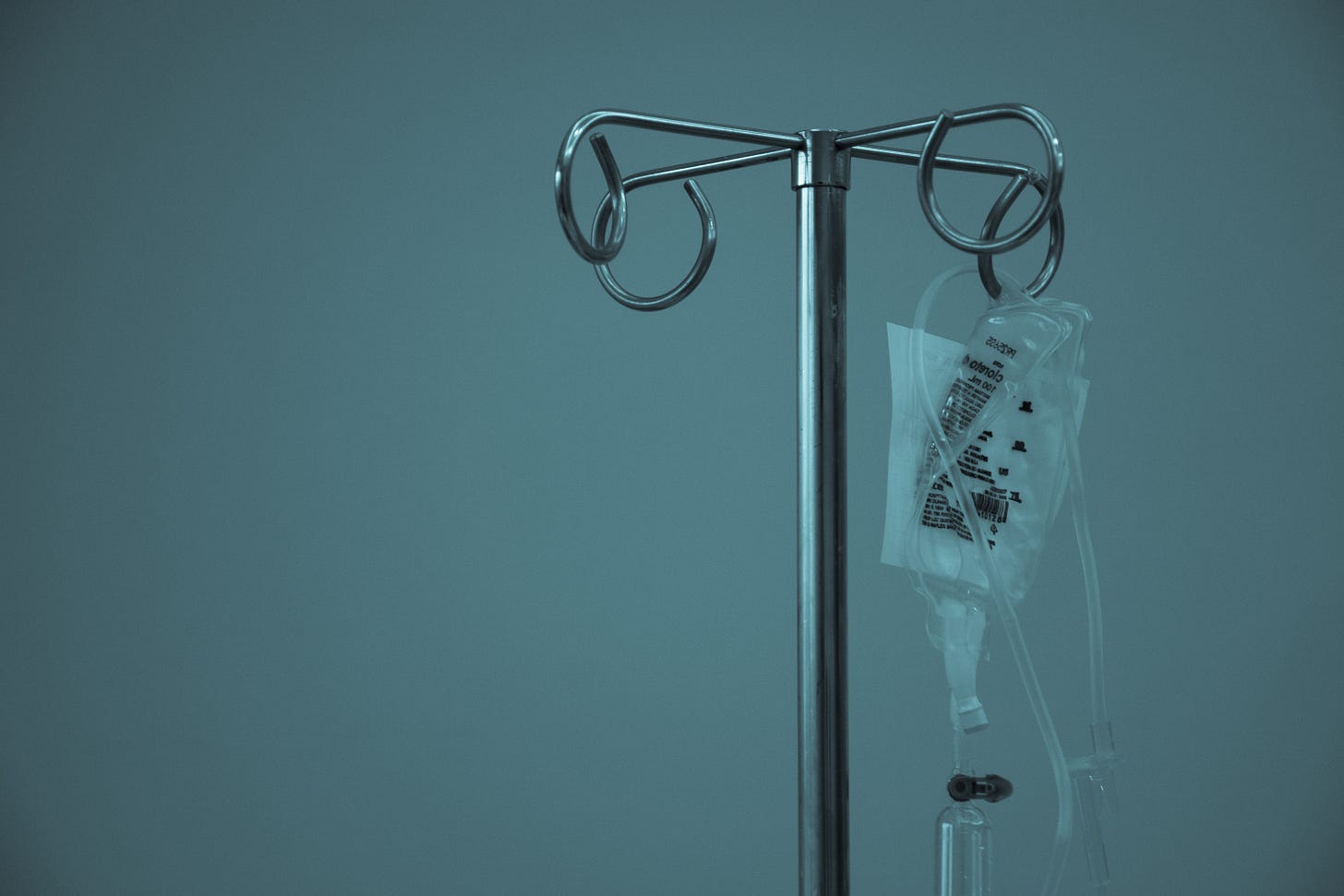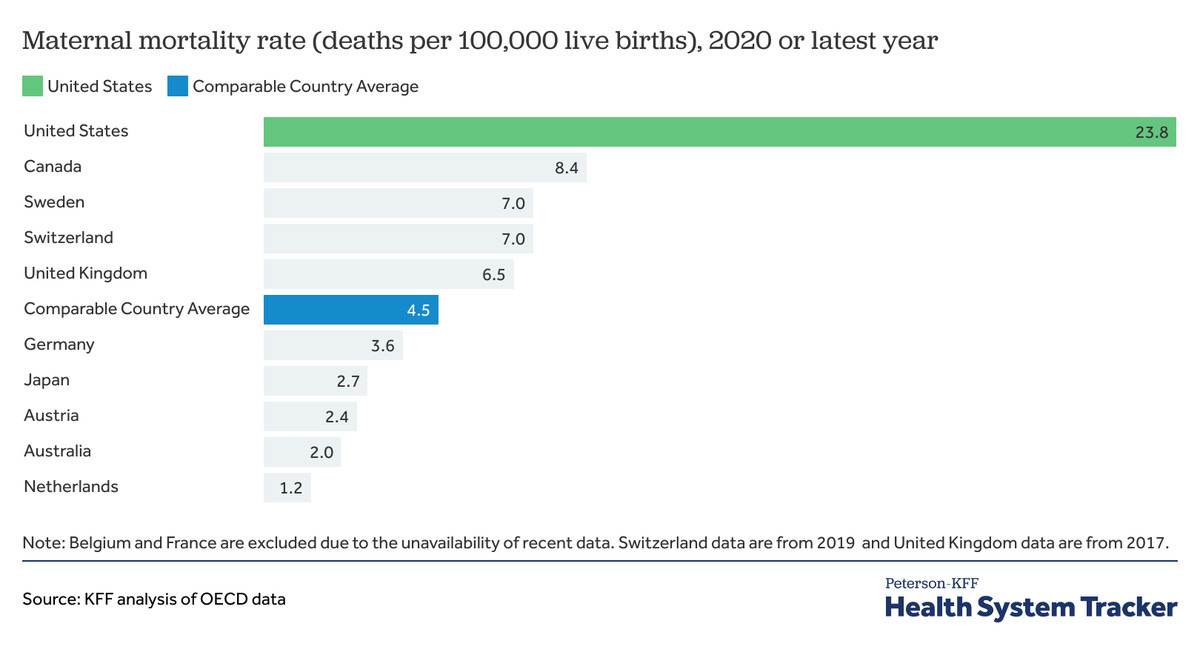🤝Advance Directives in Mental Health
Your 10/16/22 update on all things social work
Good morning! ☀️
We’ve previously written about the insufficient level of healthcare in the United States. A recent report by March of Dimes, a nonprofit organization that works to improve the health of mothers and babies, covered one part of our healthcare system: maternity care. The report specifically covered maternity care deserts, which are “counties where there is a lack of maternity care resources, where there are no hospitals or birth centers offering obstetric care and no obstetric providers.”
The research found that these deserts have expanded over the past few years and that nearly “7 million American women of childbearing age now live in a county with either no maternity care services or limited services”.
Question: How does the maternal mortality rate in the United States compare to the maternal mortality rate in other wealthy countries?
News
Advanced Directives in Mental Health
Advance directives are legal documents that allow a person to spell out their wishes about end-of-life care ahead of time. An example of this is the “do not resuscitate” order, which instructs providers that the person does not want to be resuscitated when there is an emergency.
Yet advance directives may also be used in a new context: In “helping people with severe mental illness to manage their own care.” These advance directives in mental health may be used in different situations. For example, if someone has a degenerative disease such as dementia where they are unable to make responsible decisions, or in an episodic and repetitive mental illness such as bipolar disorder or one where psychosis arises.
One of the ways in which these directives can be helpful is in relaying information about treatments that have been helpful or harmful in the past. People who undergo mental illness have gained experience and insight into their condition that allows them to make better decisions about their care. For instance, someone who struggles with bipolar disorder may want to share with a future provider that in case of an emergency, a specific medication or dosage is less effective or more effective, thereby leading to a higher level of care.
There are other ways in which advance directives may be beneficial in helping us care for those who are mentally ill. And while this idea is relatively new, it has been gaining traction. In 2014, the United Nations Committee on the Rights of Persons with Disabilities acknowledged the necessity of advance planning, and countries such as India and Australia have incorporated advance directives into their mental health laws.
In conclusion, advance directives may be an effective way to support people who have a serious mental illness. Moving forward, we must continue to conduct research, spread awareness, and integrate the use of advance directives into our laws and practice.
Other social work-related news
The Healing Through Justice project, a youth-led movement for mental healing in Chicago, is receiving a $10 million grant to expand its activism and leadership training
California’s food assistance program is experiencing high staff vacancy rates while applications for the food benefits continue to increase
A new report by Mental Health America (MHA) ranked states by mental health access and prevalence of mental health issues. It found that Wisconsin, Pennsylvania and Massachusetts rank at the top, while Arizona, Oregon and Kansas round out the bottom
Connecticut's foster care population has dropped by a third since 2019 due to strong leadership, efforts to keep families together, and “benevolent” lawsuits that pressured the child welfare system in the state to work more effectively
Reads on research
A new AI model from the University of Washington’s medical school was able to accurately identify potential signs of worsening mental illness after being trained to sift through everyday text messages
Men who belonged to unions their entire career made up to $1.3 million more on average than men who never joined one
Other reads on policy
Nearly 1 million additional Americans will have access to ObamaCare subsidies next year under a final rule issued Tuesday by the Biden administration. The new rule will cover the so-called “family glitch”, a loophole which has obstructed 5.1 million families with dependents in obtaining ObamaCare subsidies
Tech, social work, and cool opportunities 😎
Brave Health, the largest virtual mental health provider and engagement platform focused on serving Medicaid populations, announced a $40M Series C funding round
Lynchburg, Virginia-based Thriveworks has opened new youth mental health services in 18 sites across 12 states. The new offering, called TherapyLand, will provide services to children ages 12 and younger for developmental disabilities, autism spectrum disorders, ADHD, parental divorce, grief and loss, defiance and bullying, among others.
Boston-based InStride Health has launched with $26 million in new capital to expand its virtual pediatric behavioral health company.
Answer: The United States has a higher maternal mortality rate than other wealthy countries





